Reflections on racism
By Melissa Lauber
As the nation struggles with the challenges of systemic racism and white supremacy, the church is an incubator of deep thought, action, and prayer. The people of the Baltimore-Washington Conference are engaged in significant discernment and conversations about race. Some of the leaders of the Baltimore-Washington Conference shared their recent thoughts.
‘Divine Courage is needed in this hour’
The Revs. C. Anthony Hunt of Epworth UMC in Baltimore and Joseph Daniels of Emory Fellowship UMC in Washington, are thought leaders who teach and lead congregations devoted to social justice. They were asked about what United Methodists still might not understand about racism.
Rev. Hunt writes: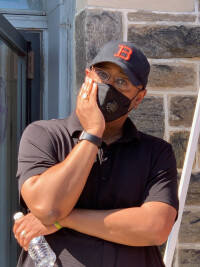
“I believe The United Methodist Church should see this season of global pandemic, which is disproportionately affecting Black and Brown people in terms of heath, death, economics, and unrest amidst ongoing racialized police-involved violence in the U.S., as a seminal opportunity to delve fully into addressing the problems of racism in the church and society.
“This time in our history can be a season for us to encounter — to coin an image and vision used by Dr. Martin Luther King, Jr. during the Civil Rights movement — a sense of the zeitgeist, the spirit of the times, that could lead us towards deep, fundamental change. The United Methodist Church, which remains a 94 percent white denomination (Pew Research Center), is one of the most segregated in the nation. We must come to a place where we fully acknowledge our tragic historic and ongoing complicity in, and with, the sin of racism on all of its levels — individual, institutional and structural.
“With regard to injustice and oppression, Rabbi Abraham Joshua Heschel once shared that some of us are guilty, but all of us responsible. So, the way that racism can be overcome in The United Methodist Church is for all of us to see it as our problem. It is not a problem for only Black and Brown people to deal with, but it is important that our white sisters and brothers (to) engage, align, partner, read, pray, listen, commit, study, ally, preach, and in other ways become constructive, sustained, and active parts of the solution towards racism’s eradication in the church and society.”
Rev. Daniels writes: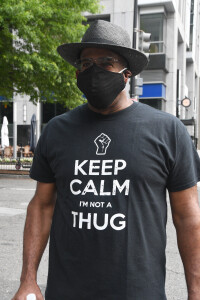
“The opportunity The United Methodist Church has to grasp in this moment is that racism is not just one in a list of long “-isms” in America, let alone the world. Racism IS the root of all the “-isms.”
“America in particular, and our denomination specifically, were established and built upon this systemic devaluing of people of color — through land theft, genocide, and the enslavement of African people — all, according to some, with the blessing of God.
“When we have the collective courage to embrace this as our ugly truth yet commit ourselves to the dismantling of this evil system of injustice, we can heal. And, we can find authentic healing from all the other ‘-isms’ which also find their origin in the devaluing of people.
“Divine courage is needed in this hour. Courage to confront the truth, dismantle the evil, and embrace the healing that God can and will provide. And, a commitment to ‘do the work’ is needed as well. Statements and services of repentance are one thing. Righting wrongs is another.”
‘This is the sacred, difficult journey’
On June 18, United Methodists in Baltimore marched for racial justice. The Revs. Dellyne Hinton of Gwynn Oak UMC and Deborah Scott of Lovely Lane UMC welcomed the marchers. They reflect on how, for them, dismantling racism is sacred work.
Rev. Hinton writes: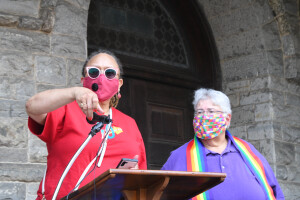
“We must struggle with the sin of racism. This means we will lay bare our sin and our complicity. It means we must admit to benefitting from systemic racism. We cannot move too quickly through this step. We must examine the intrinsic machinations of systemic racism. We must claim our benefit and our responsibility to dismantle it.
“When God created, from the very beginning, God pronounced all of God’s creation as good. The creatures have since developed a hierarchy of importance that defines the interconnectivity of God’s creation. If we are to be reconciled with God, through Christ Jesus, we have to accept that all creation is to be reconciled.
“Those who have benefitted the most from a sinful system will have the most to give up. This is painful. Those who have received from the system must accept new power. But the real work comes from understanding that the power does not merely switch hands but is transformed into equality and equity. This is painful.
“An apology from those who have benefitted is only the beginning of dismantling systemic racism. The real work happens after the realization and apology. Continue to work until you ‘rise.’”
Rev. Scott writes:
“As I consider what it means to rise in this sacred moment, many things come to mind. I think of some of my heroes like Nelson Mandela, who said, ‘No one is born hating another person because of the color of his skin, or his background, or his religion. People must learn to hate, and, if they can learn to hate, they can be taught to love. For love comes more naturally to the human heart than its opposite.’ That quote summarizes what I have lived and tried to teach in 40 years of ministry. It's the work that Micah calls us to in the 6th chapter, 8th verse: ‘And what does the Lord require of you? To act justly and to love mercy and to walk humbly with your God.’
“My prayer, my hope, is that we can be a light in the darkness that overwhelms us, that we can each be a voice for the voiceless, that we can be tireless champions for equality. This is the sacred, difficult journey we are each called too. My journey will be different than yours, we need to listen, share grace, become better educated and informed as we strive for justice with love for all God's children.”
‘Attuned to God’s wisdom and way’
The Rev. Ginger Gaines-Cirelli, senior pastor of Foundry UMC in Washington, D.C., leads a national movement of sacred resistance which seeks to actively counter the forces of hatred, cruelty, selfishness, greed, dehumanization, desolation, and disintegration in God’s beloved world. She was asked about what message she might have for those wondering how to put their faith into action.
Rev. Gaines-Cirelli writes: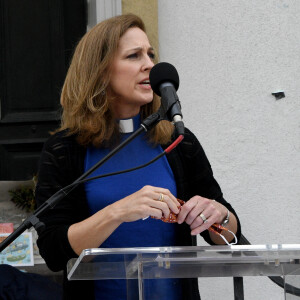
“The way to begin is to begin. Take one step. There are so many opportunities to engage in study, conversation, and action. Pray about where God is calling you to take a step and then… begin. Read a book. Join a small group, class, or conversation. Listen to what advocates and leaders in your church are suggesting as action steps beyond ‘thoughts and prayers’ and discern which step you WILL take.
“’Sacred resistance’ is a stance, a way of being in the world, and an ongoing orientation to the world. As those formed in and by relationship with Christ, our very being is turned toward God, and attuned to God’s wisdom and way. Therefore, our inward posture centers on God and resists all that is not God, resists all that is counter to the ways of God revealed through Jesus. This, then, is our way of being in the world: to be with and for God and others and to participate in God’s life of love, justice, and mending.”
When asked about what surprises her about her work with sacred resistance, she replied:
“I am often overwhelmed (perhaps not necessarily surprised) by the depth of commitment, faith, perseverance, courage, grace, and creativity I witness among those who have been engaged in this work for many years — particularly those with their ‘back against the wall.’ I have also been pleasantly surprised to witness many who are newly energized and called to deepen their practice of faith through sacred resistance.
“On the more challenging side, I continue to be surprised at the reluctance if not outright refusal by many to acknowledge that as followers of Jesus, we are called to engage in conversations, processes, and actions that affect the health and wholeness of our neighbors — particularly the most vulnerable or oppressed. The disconnect between what is considered ‘spiritual’ and ‘political,’ between ‘biblical’ and ‘secular,’ is troubling. The false dichotomy between ‘orthodoxy’ and social justice is no longer a surprise to me but continues to be disturbing. (For me, it is my orthodox theology that fuels my commitment to social justice.)
“I pray that those of us who are white will be humble, honest, reflective, and open to new insights, that we will have the courage to engage in conversations that are painful and uncomfortable, that we will risk getting things wrong as we seek to become anti-racist, and be willing to repent — which will require real change. And, that we might acknowledge, one with another, that your life is bound up with my life and my freedom is bound up with your freedom, your safety is bound up with my safety and my good is bound up with your good. No one is free until all are free. Together we will celebrate the beauty of being one family in Christ who are strengthened and blessed by one another in all our glorious difference.”
‘So that all can be truly free’
In this time of thought and action, United Methodists are also praying.
The Rev. Tony Love is the incoming president of the national Black Methodists for Church Renewal. He writes:
“My prayer is that beyond the public displays and demonstrations, my siblings and I will commit to doing the deep work of examining and exposing racism as a troubling spiritual matter. That we would engage in honest, candid ‘soul talk’ where we can be transparent, vulnerable, trusting and open to the Spirit delivering us from this sin.”
Sharon Milton is one of the BWC’s leaders in Youth Ministries. She writes: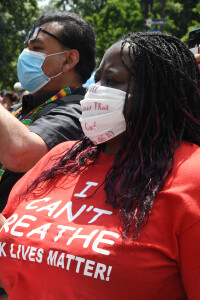
“I believe United Methodists need to first admit that systemic racism exists, not only in our country, but it is also very present in our churches and through the United Methodist conferences. We cannot fully address a sickness if we don’t first admit that the sickness exists. We need to confess and repent that we have ignored racism, specifically against Black people, because the conversation makes us uncomfortable. Once we admit it, we can then move together to heal and be anti-racist.
“I pray that we follow the guidance and prompting of the Holy Spirit. I pray that what we have started does not go unfinished. I’m praying we do not address it this moment only because it appears it’s ‘the thing to do’ right now. I pray that we realize this is a long-term movement and not something we do for a few months, and then go back to what we used to do. We have stalled too long. God is calling us to address it now. There is an urgency and the time is now!”
The Rev. Stacey Cole-Wilson is the BWC’s Executive Minister of Justice and Service. She writes: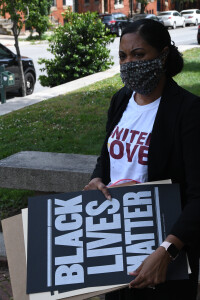
“My prayer for the Baltimore-Washington Conference is that we faithfully, corporately, and independently love one another as God loves us. I am not referencing a lofty, unprincipled or Pollyanna-ish kind of love. My prayer is for a brave, non-violent, transformational, great-minds-think-differently-and-alike kind of love to live in us.
“It is a love that dares to exist and thrive despite physical and spiritual weapons formed against it. It is sacrificial love that resists all that is counterfeit and outside of God’s will. It is vulnerable and persistent love that refuses to be complicit with the sin of racism or silent as hierarchies of human value are perpetuated and modeled as normative. It is hopeful love that is empowered by the Hope of the world and it is grounded in God’s living Word. It is love that is determined to love, not for a moment, an instant, nor an hour; but, for a lifetime. It is merciful love that daily makes no room in oneself for unexamined biases, tropes, isms, privilege, caricatures, hate or injustice of any kind. It is love that refuses to judge based on one’s skin color, socioeconomic status, ZIP code, financial giving history, friend circle, professional affiliations, titles, degrees, birth order, perceived or real privilege, abilities, gender, sexuality, or intellect.
“This love affirms the image of God, the Imago Dei, in the other, seeks equity, and works to liberate those who are oppressed from the unjust behaviors, policies, institutions and the systems that perpetuate them.
“This love is a response to the commandments to ‘Love the Lord your God with all of your heart, soul, and strength and to love your neighbor as you love yourself.’ According to Jesus, there is no commandment greater than these.
“So, my prayer is for this kind of love to permeate, hover above, hem around, and flow from each one of us. May it go before us to create a new heaven and a new earth for God’s glory so that all can be truly free. So be it. So be it even now.”


I'm tired of the conversations. When are we as a black people going to determine our own destiny? When are we going to stop depending on others for our well being as children of God? Racism is real, has been for centuries. I agree structural and institutional changes are still needed to make life better for everyone. At the same time I don't want pity and I don't need sympathy. Stay on the front lines for justice. Words are not enough.
I am not a bad white person. I treat people of all colors, races, faiths, and nationalities with respect, love, and dignity they deserve. But I feel as if I am thrown into the same pile of white people who think the opposite of me. So does the term "white supremacy" include me? I certainly hope the term is not applied to all white people. To stereotype white people like myself, it is not being a Christen, it is continuing the sin and stain of racism.
I agree with the above. I feel like I am being asked to admit that I am a racist, just because I am white. I respect my Black Pastor. I voted for a black man for president, and a black man for county commissioner. I will not apologize for being white, just as I don't expect any black person to apologize for being black. Much of the language on this website is blatantly biased against white people. This is certainly not what I expect from my church.